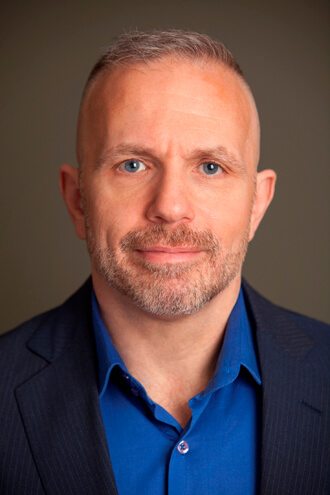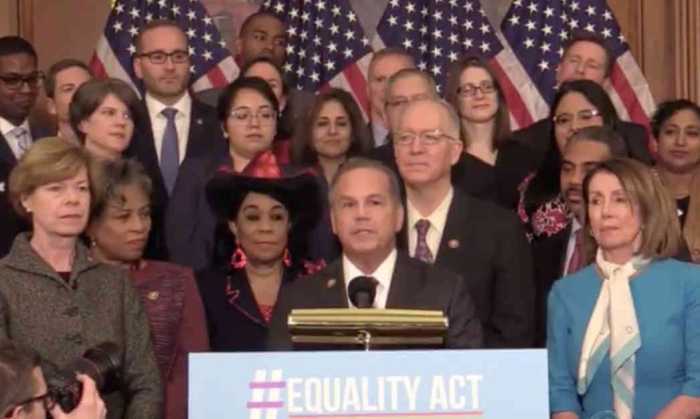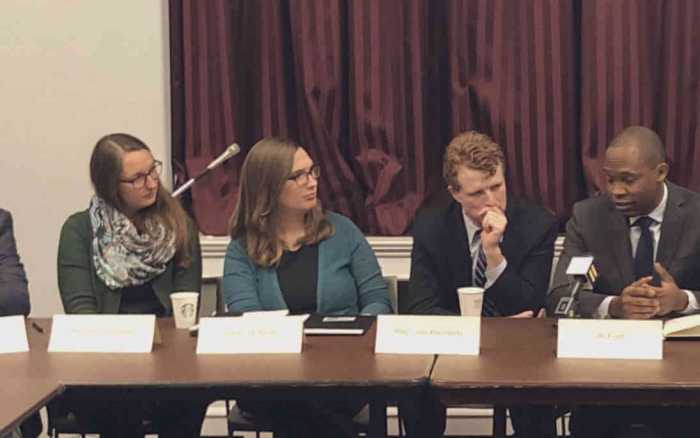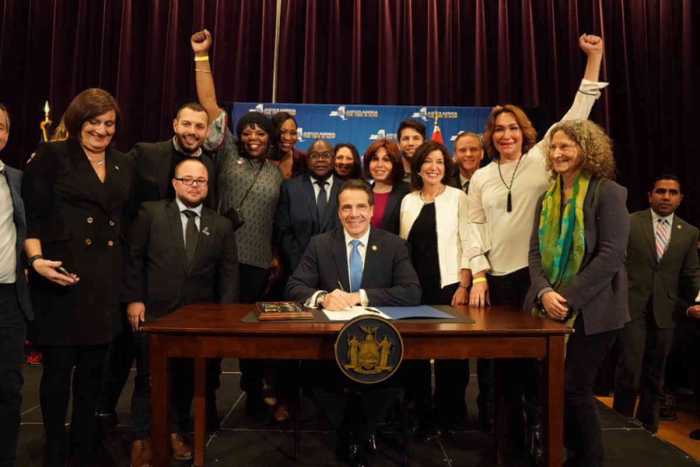In the course of a 179-page overview of still-daunting challenges confronting America’s LGBT community — compelling in both its breadth and its frequent forays into granular detail — Michelangelo Signorile provides two passages that, for me, were telling first and foremost about the author himself.
“Being vocal, organizing at the grass roots, and collectively demanding action,” he explains, have always been critical to the community’s post-Stonewall advances, “but especially so since the emergence of AIDS drew a sharp line and instilled in us an attitude of ‘never again.’” He continues, “The mantra of ACT UP, ‘Silence = Death,’ has been in the DNA of every other aspect of the movement from then on. We weren’t going to rest.”
Earlier in “It’s Not Over: Getting Beyond Tolerance, Defeating Homophobia, & Winning True Equality,” Signorile talks about the value of self-defense education in building individual empowerment in the community. Recalling a Staten Island youth in which he was called a “faggot” at school, but also taught to stick up for himself by his second-generation Italian Catholic father, he writes, “My own instinct was also to fight back. Years later I realized that that was the basis of all of my eventual activism and writing.”
The experience was clearly formative for Signorile over the long run, but something more fundamental was this: “Fighting back against bullies was something I had to do in order to survive emotionally.” And, he asserts, social science has since demonstrated he was not alone in this: “Research suggests that young people who stand up to their bullies are happier and more productive later in life.”
Mike Signorile sounds urgent warning that unapologetic battle for equality must still be waged
These windows into Signorile’s moral and psychological education will no doubt provoke “aha moments” of recognition for readers who have followed his career for the past quarter century-plus — in the late ‘80s as a brash new voice at the brash Manhattan newspaper OutWeek, today as the gray-hair editor at large at Huffington Post’s Gay Voices vertical, and for the past dozen years as a talk jock on SiriusXM Radio.
Michelangelo Signorile. | JAYNE WEXLER/ HOUGHTON MIFFLIN HARCOURT
Signorile has always been a fighter; in fact, on more than one occasion targets or critics of his hard-charging journalism have suggested it is he who is now the bully. His activist passion seems undimmed since the worst days of the AIDS crisis. And his ubiquitous presence across a variety of media platforms certainly suggests he squanders little time at rest.
With “It’s Not Over,” Signorile makes an urgent case against what he calls “victory blindness,” a view of the world he argues is really a “dream… a kind of bedtime story that tells us we’ve reached the promised land.” His use of “victory blindness” is, of course, a direct retort to Linda Hirshman’s 2012 history “Victory: The Triumphant Gay Revolution,” but Hirshman’s narrative, in its broadest framing, is one Signorile clearly worries is being complacently embraced across the LGBT community.
“Seduced” by the sweeping advance of marriage equality, he argues, the community is ignoring looming problems: ongoing hate violence, suicides and homelessness among youth, persistent rates of HIV infection and the criminalization of those with the virus, and the lack of civil rights protections in more than half the states and at the federal level. Signorile ties all these problems to “a much larger constellation of homophobia, transphobia, and bigotry that continues to permeate this country, and that every gay or transgender person recognizes intuitively.”
Meanwhile, the anti-gay right, “rebranding” itself to take account of more positive popular attitudes toward the LGBT community, is pushing a backlash making itself the “victim” of an overreaching gay agenda intolerant of the “religious freedom” of people with moral objections to homosexuality. The book looks at how this line of resistance set up last year’s battle in Arizona over legislation that aimed to provide broad exemptions from nondiscrimination laws based on religious beliefs — and, since completing his book, Signorile has been outspoken as the issue surfaced in Indiana, Utah, and Arkansas.
The “gay establishment” — often as embodied by the Human Rights Campaign — is a frequent Signorile target, but it is not institutional triumphalism alone that concerns him. “Victory blindness,” he asserts, led a surprising number of typically outspoken activists to trim their sails in response to the flap over Mozilla’s appointment of Brendan Eich, a financial backer of Proposition 8, as CEO. Even though Eich, in short order, was forced to resign in the face of a negative “market” reaction, many in the community voiced squeamishness about his takedown. It’s not surprising to read Signorile castigating his bête noire Andrew Sullivan for “giving ammunition to the enemy” in saying Eich had been “scalped by some gay activists,” but it’s striking to see him call out blogger Jim Burroway, AIDS leader Peter Staley, and journalist and pundit Dan Savage, as well.
“Magnanimous” is the word he quotes both Savage and Burroway using to describe how the community should respond to revelations like those that surfaced about Eich. Signorile, in contrast, sees a vital role for the “shaming of opponents for their bigotry” in moving the dial on our agenda.
Signorile uses the Eich controversy to segue into a discussion of NYU law professor Kenji Yoshino’s brilliant 2006 book “Covering: The Hidden Assault on Our Civil Rights.” Yoshino, a gay Asian American, describes “covering” as a tendency of minorities and women in society to “downplay [their] difference, making it palatable or at least inoffensive.” Being a “team player,” Signorile explains, is a strategy used by those who think they’ve won their rights and are now focused on consolidating gains and not falling back. Covering, in Yoshino’s view, can be a useful strategy on the path toward advancement, but it is also “morally complex” — there is a limit to its effectiveness and it imposes a cost on those who practice it. Signorile is unambiguous in asserting that the LGBT community has reached the limit on what covering can do for our advancement.
Signorile’s integration of Yoshino’s perspectives into his analysis here is on target. Each of us faces the choice between personal authenticity and covering in countless situations on the job and with our families, non-LGBT friends, and neighbors every day; the instinct to go along to get along is always a strong one. Politically, the posture our community and its leadership and advocacy groups assume in public debate also often carries an implicit test of whether we will cover, putting on the most innocuous, nonthreatening face so they will “like us.” Signorile believes that approach — which he sees as a declaration of weakness — simply does not work.
One thing missing from this discussion, however, is a consideration of the cost borne in a strategy of public shaming of our opponents. LGBT people grow up with a painful understanding of the power of shame and, perhaps too, of the tendency of its toxicity to infect both ends of the shaming relationship. Shaming is a difficult strategy to sustain, and it’s not surprising that being magnanimous has a powerful allure for many people.
Still, Signorile harnesses the concepts of victory blindness and covering to thoughtful consideration of a host of big issues before us, including our representation in movies and television and the way that our lives and aspirations are reported and judged by the news media.
I came away disappointed with a chapter that probably aims to do too much in just 21 pages — “Winning True Equality.” There, Signorile takes on a host of recent public battles — including the repeal of Don’t Ask, Don’t Tell, the failed effort over more than two decades to enact a federal Employment Non-Discrimination Act, and the dramatic turnaround of the marriage equality issue — that he concedes “doesn’t at all purport to be a complete history.” And in fairness, the issues he tackles here are ones he has written and talked about extensively and with informed insight in the past half dozen years.
My problem, however, is that the level of generality demanded by space constraints here leaves important conclusions that are asserted still wide open for debate. Broadly speaking, he sees “incrementalism” — or “legislative covering” — as a “failure.” Chad Griffin’s “bold” vision in federalizing the marriage equality issue in his Prop 8 lawsuit, however, was only possible after a decade and a half of incremental slogging by Evan Wolfson and Mary Bonauto, among many, as Signorile himself acknowledges. And though it’s true that the marriage equality drive abandoned a focus on “rights” in favor of “love and commitment,” many would question whether covering was not a big part of that refocus. Jo Becker’s discussion in “Forcing the Spring” about how the Prop 8 plaintiffs were vetted — and her take was one very sympathetic to the cause — makes clear that a premium was placed on putting forward the most palatable face of gay and lesbian America.
One other qualification to Signorile’s analysis I think is in order has to do with his characterization of the threat posed by our opponents on the right. He is dead right that they are wily shape-shifters who aren’t going anywhere and have hit on a very potent weapon in characterizing themselves as “victims” of our “religious intolerance.” But we also have to consider the right’s success — largely at the state level — in recent years in curtailing women’s access to abortion and healthcare generally, in limiting or eliminating the collective bargaining rights of workers, and in criminalizing undocumented immigrants. Many of those reversals have succeeded unchecked. It’s true that in beating back new religious privileges to discriminate in Arizona, Indiana, and Arkansas we did no more than preserve a status quo that still guaranteed no statewide LGBT nondiscrimination protections, but we were able to galvanize public opinion in ways that are no doubt the envy of advocates for women, labor, and immigrants.
Signorile is certainly not unmindful of the progress the community has made; in fact, the point of his book is to underscore just how necessary the engagement of unapologetic grassroots activists is in advancing the ball. Victory blindness and covering are, above all in his view, the occupational hazards of LGBT movement insiderism.
In that light, his intriguing discussion of research carried out by a Google data analyst points up just how much work the community itself — as separate from its professional leadership — needs to do. Studying sources as diverse as Gallup surveys, Census data, Google searches, and Facebook and Craigslist posts, Seth Stephens-Davidowitz has identified startling disparities that persist in the rate at which LGBT people come out based on where they live in this country — and even in rates at which they self-identify in the US versus Canada.
Which brings us back to a very old story — the crucial role played by people simply coming out. That has always been a concern animating Signorile’s work. With this book, he makes a passionate case for the duty borne by engaged LGBT citizens — if only they will step up and take it into their own hands.
IT'S NOT OVER: Getting Beyond Tolerance, Defeating Homophobia, & Winning True Equality | By Michelangelo Signorile | Houghton Mifflin Harcourt | $27 | 259 pages, with endnotes




































